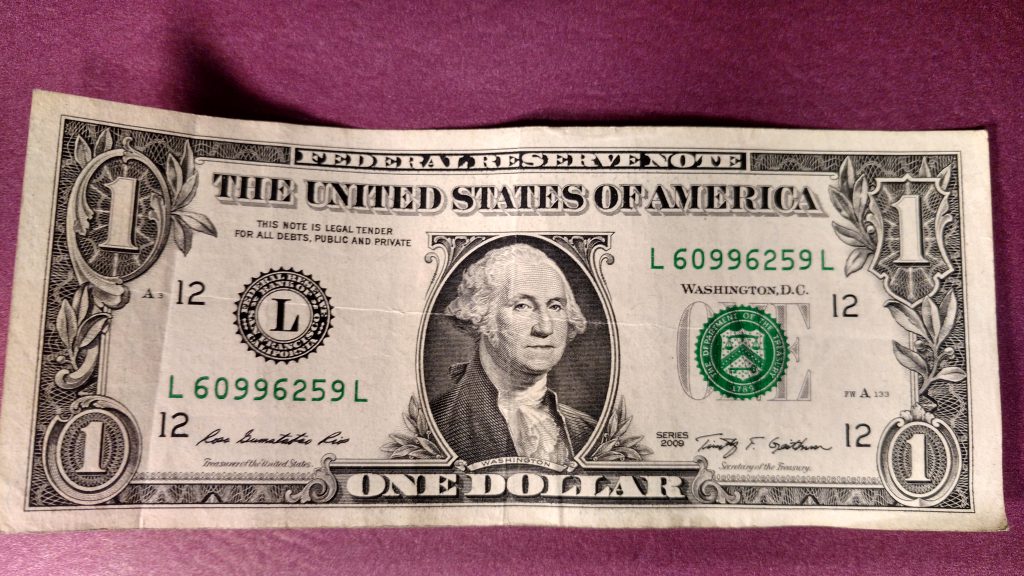Fiserv Paid No Federal Taxes in 2020
Not a dollar of taxes on $1.1 billion in pre-tax earnings. Among 55 corporations that paid nothing.

One Dollar Bill. Photo by Xchangerjunior, CC BY-SA 4.0 <https://creativecommons.org/licenses/by-sa/4.0>, via Wikimedia Commons
2020 was a profitable year for Fiserv, the financial services company located in Brookfield. The company earned $1.1 billion in pre-tax earnings on revenue of $14.85 billion.
Even better, it paid not a dollar in federal taxes on those earnings.
Fiserv was one of 55 American corporations that paid nothing in federal taxes in 2020, according to a new report by the Institute for Taxation and Economic Policy, based on information companies must provide to the Securities and Exchange Commission stating their pretax income and federal and state taxes paid on that income.
The report’s list of the 55 corporations paying no federal taxes showed that Charter Communications earned the most in pre-tax earnings, $3.7 billion, while it collected a $7 million tax rebate.
Danaher, a corporation which describes itself as “a global science and technology innovator,” got the biggest tax rebate, $321 million. In all the 55 companies collected $3.5 billion in federal tax rebates.
Fiserv had the 13th highest pre-tax earnings of the 55 companies.
Such financial windfalls were not “a flash in the pan,” the report noted, but enjoyed regularly by some companies. Twenty-six corporations have paid no federal income taxes since 2017, the report found, including such household names as Nike, FedEx and Dish Network. Together, the 26 companies have earned more than $77 billion in profits since 2018 while receiving nearly $5 billion in rebates, for an effective three-year tax rate of negative 6 percent. Fiserv was not among those 26 companies.
The CARES Act was designed to help people and businesses to stay afloat during the pandemic, but some companies “used a CARES Act provision to ‘carry back’ 2018 or 2019 losses to offset profits they reported in prior years, resulting in a rebate that reduced their 2020 taxes, in some cases to less than nothing,” the report noted.
The report was released at a time when President Joe Biden is pushing a $2 trillion infrastructure plan which would increase the corporate tax rate to 28% and raise taxes on U.S. companies’ foreign profits to help pay for this spending. Biden and others have argued that the Trump tax cuts of 2017 need to be rolled back.
The Fiserv company also made the list of another report critical of American corporations, by the non-profit shareholder advocacy group As You Sow, which included its former chief executive officer Jeffery Yabuki as one of the 100 most overpaid CEOs in the nation. Using a measurement that took into account a company’s increase in shareholder value among other factors, the analysis found Yabuki’s $27.6 million in annual compensation was $13.8 million more than he deserved. Yabuki, who regularly ranked as one of the top-paid CEOs in Wisconsin, stepped down after 15 years with the company in May 2020.
Back in the News
-
Eric Hovde Has Another Bad Week
 Apr 22nd, 2024 by Bruce Murphy
Apr 22nd, 2024 by Bruce Murphy
-
Josh Kaul Investigating Fake Electors?
 Apr 17th, 2024 by Bruce Murphy
Apr 17th, 2024 by Bruce Murphy
-
State’s 7 Richest People Worth $72 Billion
![John Menard Jr. Photo by Travisvanvelzen (Own work) [CC BY-SA 4.0 (https://creativecommons.org/licenses/by-sa/4.0)], via Wikimedia Commons](https://urbanmilwaukee.com/wp-content/uploads/2020/09/John_menard_jr-1-e1630092418445-185x122.jpg) Apr 8th, 2024 by Bruce Murphy
Apr 8th, 2024 by Bruce Murphy






















Another corporation taking tax payer handouts and using socialism to give their corporate warlords more of tax payer money.
Our corporate and business development economy is built around government handouts and tax breaks.
This is obscene. Let’s hope Biden can make some changes.